

Clark leads Hawkeyes to title
The two-time Big Ten Player of the Year posted the third triple-double in tournament history to push Iowa over Ohio State.
Peterson Sports Editor
MINNEAPOLIS — Caitlin
Clark thinks her black and gold Bruce Lee Kobe shoes bring good vibes.
Those good vibes were evident in Iowa women’s basketball’s mauling of Ohio State, 105-72, on Sunday to become Big Ten Tournament champions for the second straight season.
The Hawkeyes’ 105 points is the highest number of points in a Big Ten Tournament Championship Game, and the 33-point difference is the largest margin of victory.
“To win back-to-back championships is so hard to do in this league,” head coach Lisa Bluder said.
“This is an amazing league with great coaches, great players. I just feel really, really thankful that we have this opportunity today to
win this again.”
Clark, who registered 30 points, 10 rebounds, and 17 assists, became the first player in Big Ten history to post a triple-double in the conference championship game. She’s just the third player to record a triple-double in tournament history.
“Seventeen assists on two turnovers; I don’t know how you can say that she’s not the player of the year in this country,” Bluder said.
“I just don’t know how you can say that.”
Iowa fans erupted in cheers as Clark brought down her 10th rebound — the last thing she needed for a triple-double — with just over five minutes left in the game.
The tournament-record 9,505 fans, most of whom were clad in Black and Gold, gave Clark a standing ovation as she grinned, run-
ning the ball back down the court. “I knew I needed one more, coach Bluder told me right before,” Clark said. “It was a really long rebound, so I had to turn the jets on to get it … it was a fun moment with the arena, I was laughing a little bit.
“I think our fans have been incredible in our three games here,” Clark added. “I don’t know if we’d do it without them. It’s literally home-court advantage, chanting ‘Let’s go Hawks’ with 45 minutes left in warmups. I mean, that’s probably pretty intimidating if you’re the other team, so a lot of credit goes to them.”
Clark also became the Big Ten Tournament MVP for the second straight season. Clark, fifth-year senior center Monika Czinano, and senior guard Gabbie Marshall were named to the All-Big Ten Tournament team.
The Hawkeyes dominated the Buckeyes from the opening tip until the final buzzer.
The second-seeded Hawkeyes put on an offensive clinic from the jump, shooting 72.4 percent from the field in the first half and outscoring the fourth-seeded Buckeyes, 61-24. Iowa’s 61 points is a program record for points in a half.
Clark nearly outscored the Buckeyes herself in the first half, putting up 23 points. Czinano was firmly in double figures at the half as well, putting up 17 points.
“I think we were getting a lot of stops, and our defense was really moving,” senior Kate Martin said. “We were communicating a lot. And then when we got stops, we got to push and transition a lot, and we were moving hard, cutting hard on the offensive end and getting
the ball inside.”
Ohio State attempted to mount a comeback in the second half, going on an 11-4 run to start the third quarter. The Buckeyes also started their infamous fullcourt press — which was top-seeded Indiana’s downfall in the semifinals — to limit the Hawkeyes’ scoring.
Ohio State outscored Iowa, 30-20, in the third quarter, but the Buckeyes needed a miracle to catch up to the Hawkeyes — something they couldn’t get.
Iowa eclipsed 100 points on a 3-pointer from Marshall with just under five minutes left in the game. The scoreboard at the Target Center, which seemingly wasn’t prepared for Iowa’s offensive onslaught, started to cut off the third number.
Iowa emptied its bench on the way to becoming conference champions, with some players getting in a game for the first time in the tournament.
“A lot of times, it can’t happen, or it doesn’t happen, right?” Bluder said. “I mean, usually they’re nail-biters, or it’s down to the last few seconds. So, it felt good to have a lead like this and be able to coast into the end and be able to have everybody out there.”
With the win, the Hawkeyes automatically qualified for the NCAA Tournament. Iowa will host the first two rounds of the tournament at Carver-Hawkeye Arena as a projected No. 1 or No. 2 seed. chloe-peterson@uiowa.edu
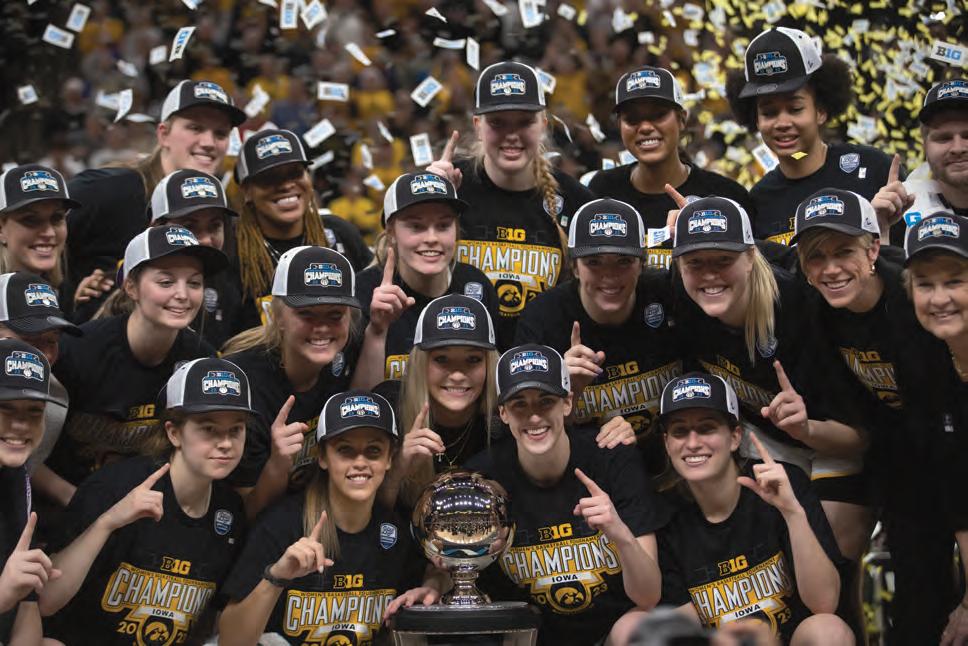
Clark considering extra season with Hawkeyes
The Iowa women’s basketball junior has not ruled out taking advantage of her extra year of eligibility in 2024-25.
for the reigning WNBA champion Las Vegas Aces, holds the NCAA scoring record with 3,527 points.
Clark also has 734 career assists as of March 5 — less than 200 away from the Big Ten record of 901, which was set by Ohio State’s Samantha Prahalis from 2009-12. The NCAA record of 1,307 was set by Penn State’s Suzie McConnell from 1984-88 before the Nittany Lions joined the Big Ten.
But Bluder said discussions haven’t started about Clark staying for a fifth year. Right now, they’re focused on tournament season. “We haven’t talked about that; fifth year is just too far down the line,” Bluder said. “We’re focusing on now and then, obviously, next year.”
Other than breaking records, Clark also has her name, image, and likeness deals to think about.
lege athlete and hosts her own website to sell products. Clark would take a hit to her merchandise sales in the WNBA, which regulates jersey and official merch sales and gives shares to players. Under the WNBA’s 2020 Collective Bargaining Agreement, players and the league get a 50-50 split of incremental revenue — which is money made after the WNBA hits its target revenue for the season. While she didn’t reveal how much money she’s making from her NIL ventures, it’s more than the projected average $72,141 WNBA rookie salary for picks 1-4.
Chloe Peterson
Sports Editor Hawkeye fans could have five years of Caitlin Clark. The Iowa women’s basketball junior, who joined the Hawkeyes in the 2020-21 season, is part of the final class that was given an extra year of eligibility because of COVID-19.
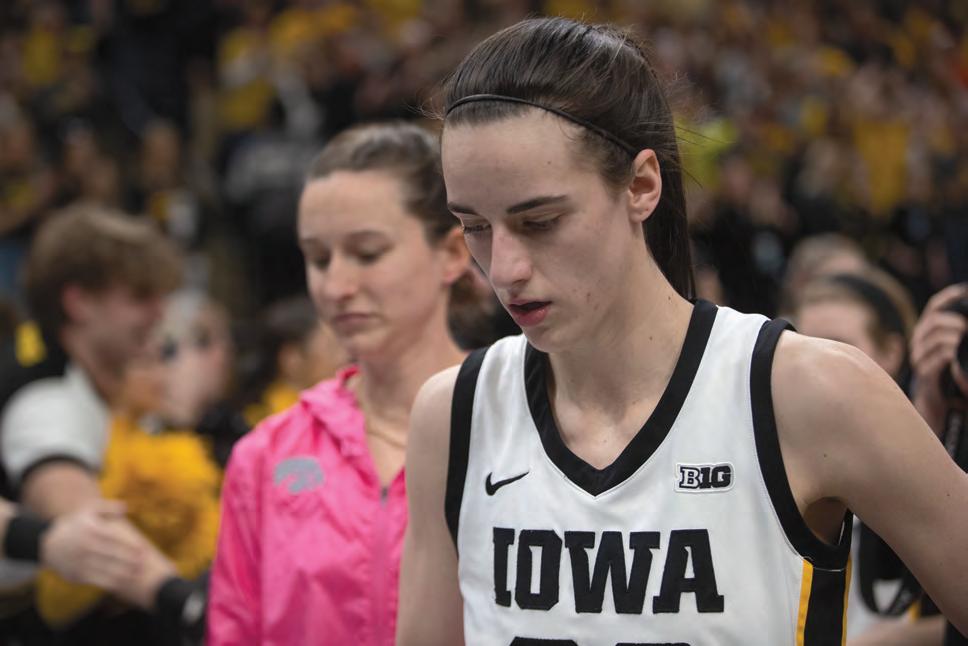
As of now, the junior hasn’t ruled out two more seasons as a Hawkeye.
“There are definitely pros and cons to both,” Clark said. “I can probably leave and go to the WNBA draft [in 2024] or I can come back for a fifth
year. So, to be honest, I have no idea what I’m going to do, and I haven’t thought much about it. I always kept saying, like, ‘I’ll just worry about that later,’ but I can’t believe I’m going to be a senior next year. So, that’s pretty crazy.”
Clark said she’ll likely make her decision ahead of her senior season in 2023-24. She said on “The Dan Patrick Show” on Feb. 27 that she would seriously consider staying in Iowa because of her love for her teammates and coaches.
“I love college basketball,” Clark said on the talk show. “I don’t know.
It would be hard to leave. I think what we’ve been able to build has been super special, too. But more than anything, I love this program, I love getting to play for coach [Lisa] Bluder, I love getting to play with my best friends.”
If the two-time Big Ten Player of the Year does return for a fifth season, she has the chance to break almost every career record in the Iowa women’s basketball and Big Ten record books. She already holds the Big Ten career record with nine triple-doubles and the season record with five.
Clark, who has 2,525
career points as of March 5, will likely break former Hawkeye Megan Gustafson’s all-time Iowa points record (2,804) in her senior season in 202324. If she returns in 202425, that record could be nearly untouchable.
She could even have a shot at the Big Ten and NCAA scoring records in her fourth year next season — in a fifth season, she could smash them.
Ohio State’s Kelsey Mitchell, who played from 2015-18, holds the Big Ten scoring record with 3,402 points. Kelsey Plum, who played for Washington from 201317 and currently plays
Clark is the only collegiate athlete to have an NIL deal with Hy-Vee — a popular Midwest grocery store chain. Kansas City Chiefs quarterback Patrick Mahomes is the only other athlete with a HyVee deal.
“Just me,” Clark said of anyone in the WNBA having a Hy-Vee deal. “I guess I’m lucky enough for that.”
She’s also one of five college athletes to have an NIL deal with Nike and holds sponsorships with H+R Block, the minor league Iowa Cubs, and Topps Trading Cards, according to On3.
Clark can also freely make money off of her merchandise while a col-
Those deals won’t necessarily go away once Clark leaves Iowa and heads to the WNBA. But if Clark is drafted to a team outside of the Midwest, she is bargaining the chance of Hy-Vee not renewing its deal with her, along with other regional deals.
“I know the salaries are starting to change quite a bit in the WNBA, but I think something that’s lost too is that people in the WNBA — they’re still getting the same endorsement deals that you would in college,” Clark said. “They’re still being sponsored by Nike, being sponsored by Under Armour. It’s kind of the same as in college, but you’re also a professional athlete at the same time. I don’t think that really would be too much of a consideration for me when I’m making that decision.” chloe-peterson@uiowa.edu

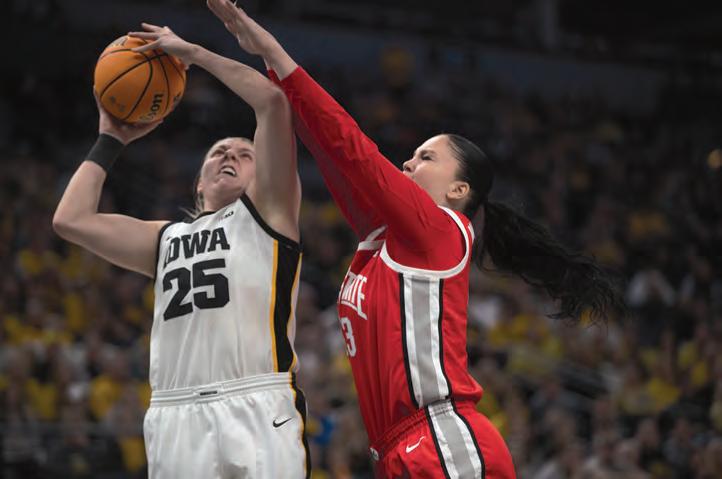

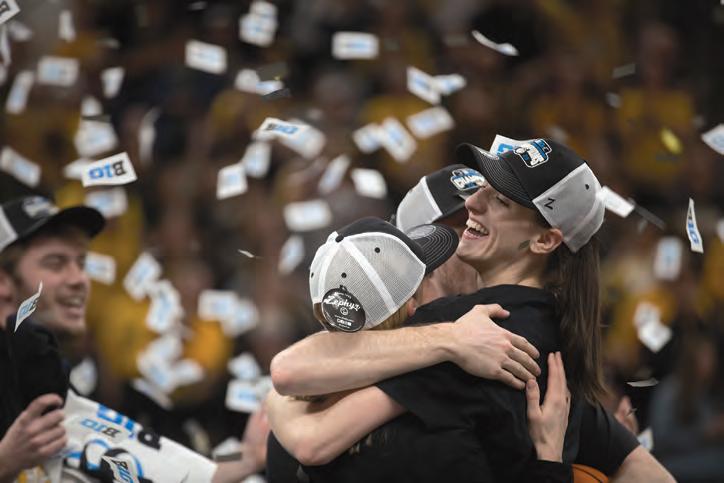
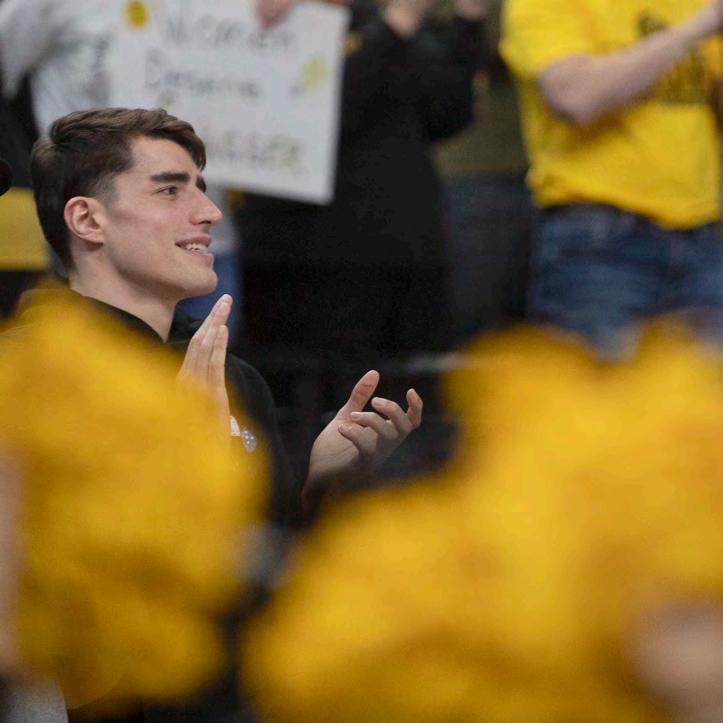
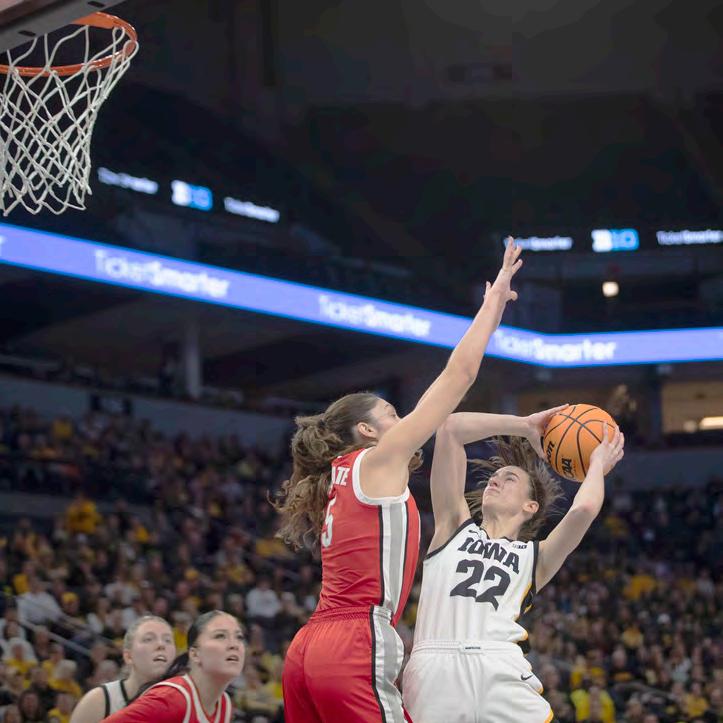
Marijuana laws are outdated
Iowa legislators must prioritize legalizing marijuana in their agendas.
Iowa needs to loosen up and legalize marijuana.
Iowa House Democrats introduced legislation to legalize recreational marijuana last month. While the bill was terminated in Iowa Legislature last week, marijuana should still be at the top of lawmakers’ priorities. While unsafe to use frequently, marijuana does not have more dangerous effects than alcohol. Therefore, it does not make sense for alcohol to be legal and the other illegal. Marijuana has been fully legalized in 21 states, and it’s time for Iowa to become the 22nd.
The enforcement of marijuana is a waste of time and resources for law enforcement. Legalizing marijuana would save U.S. taxpayers between $7 billion and $13 billion every year. There are clear racial disparities within the enforcement of Iowa’s marijuana laws. The American Civil Liberties Union reported in
COLUMN
2013 that Iowa had the most severe racial disparities in marijuana arrests in the nation. Despite equal usage rates, a Black person is eight times more likely to be arrested for possession in Iowa. Legalizing marijuana would help do away with this gross injustice. While the legislation introduced by Democrats is a progressive step forward, if Iowa legalizes marijuana, it must also expunge the records of anyone convicted for possession. This should go beyond the two-year mark proposed by Iowa Democrats. Additionally, Iowa should commit to providing reparations for communities that have been negatively impacted by the implementation and enforcement of past marijuana laws. This includes investing in jobs and schools in those communities. These reparations could be funded by the significant revenue Iowa would receive from taxes placed on marijuana sales.
Legalizing marijuana would also boost the economy in Iowa. Since Colorado introduced a marijuana tax in 2014, it’s enjoyed over $2 billion in revenue. The state has used this revenue to boost its social
programs, including education and public health.
Ultimately, Iowa legislators should legalize marijuana because it’s what people want. As of 2021, 54 percent of Iowa adults favor legalizing marijuana for recreational use compared to just 39 percent opposed, according to the Des Moines Register. This number has skyrocketed since 2013, when 29 percent of Iowa adults fa-
vored legalization. Even in a state that hasrecently seen an abundance of Republican electoral success, voters strongly favor the legalization of marijuana.
Opponents of legalizing marijuana may argue that legalization will cause more young people to start using marijuana. However, studies in Washington and Colorado demonstrated that the usage rate among
young people actually fell after legalization.
Legalizing marijuana does not mean anyone will be able to get it at any time. Regulations on who can buy it and when can be implemented to ensure safety just as they are with alcohol.
Legal or not, people are going to find and create ways to distribute, obtain, and use marijuana. Thus, it is logical to ensure that
the product they are using is safe. If marijuana is legalized, it can be regulated. Regulations such as licenses to sell marijuana, quality assurance, and lab testing will make it safer to use.
Marijuana legalization is a no-brainer. It helps fix a long-standing injustice, all while giving the economy a strong boost. Iowa must fully legalize marijuana.
evan-weidl@uiowa.edu

Do not fund crisis pregnancy centers
ters are a source of biased and misleading information that could be detrimental to public health.
Kyle Tristan Ortega Opinions Contributor
People should have access to legitimate reproductive health care.
We all know that accessible reproductive health care is significant for good public health. But what we do not often think about is that the health care we have access to being legitimate and unbiased is just as significant, if not more so.
Gov. Kim Reynolds and Iowa Republicans are pushing to increase funding for crisis pregnancy centers.
But crisis pregnancy cen-
THE DOC IS IN
Cannabis, marijuana, or weed is becoming a popular drug of choice in the U.S. Whether someone is a daily user or has only tried this product once, it is important to know a few things so the user can get their high as safe as possible.

These centers are non-licensed clinics that provide free services such as ultrasounds, pregnancy counseling, pregnancy tests, and more. The fact that they are non-licensed clinics could lead to some skepticism, and these clinics also attempt to dissuade patients from getting abortions or using birth control through misinformation. This is problematic for multiple reasons. First, the misinformation the centers provide could prevent a patient from getting medical treatment they need. Specifically, pregnant people could come to one of these centers seek-
ing advice and receive biased information without knowing it, which opens them up to the possibility of health complications.
One testimony from a patient noted that their experience in a center left them feeling deceived, as they went in thinking it was a real clinic. Another patient’s account notes that they were not only given erroneous medical information, but also a religious speech from one of the workers about the effectiveness of contraception.
Additionally, the time they spend at the centers could delay their decision-making in terms of what to do with their pregnancy, which can be a significant problem in states with gestational age bans.
These bans are laws that make abortion illegal after the fetus reaches a certain gestational age.
According to the Alan Guttmacher Institute, pregnancy complications and sexually transmitted diseases account for onefifth of the global diseases among women.
Therefore, considering its possible demand, accessible reproductive health care is necessary. But if someone is seeking reproductive health care, they must be given access to facilities that want to help them, not facilities that push a political agenda.
This is significant because the U.S. Agency for International Development states that legitimate reproductive health care reduces maternal deaths
by 30 percent annually and saves 1.4 million children under five each year.
If we continue to fund crisis pregnancy centers, we would only be putting people with reproductive health care needs at risk. Thus, Reynolds and Iowa legislators should not increase funding for these clinics and facilities.
Instead, funding should go to licensed clinics that are managed by trained professionals under the medical field, such as Planned Parenthood. Additionally, funds should go toward making health care more available for marginalized and vulnerable populations in Iowa, such as those in rural communities without accessible reproductive health care clinics.
Let’s talk about toking
How to know your cannabis is not contaminated.
There is a lot we can do with the state’s funding, but funding crisis pregnancy centers should not be one of those things. The main problem with these facilities is that they push a political agenda on people when they are most likely in need of advice or help, which is highly unethical.
Politics should be kept in the realms of argument and debate, not in the dissemination of misinformation on medical care. If one wants to argue against abortion, they are free to do so. However, using “fake” clinics to trick patients into believing something is another story — a very problematic one.
kyletristan-ortega@uiowa.edu
For Iowans with conditions such as seizures, inflammatory bowel disease, cancer, or chronic pain, Iowa has a medical cannabis program. This allows the purchase of weed with the permission of a health care provider.
How to tell if
marijuana is laced
There has been a rapid increase in drug overdose deaths in the U.S. in the last few years. Many of these deaths are because opioids, a painkiller that slows breathing if taken in excess. Recently, there have been reports of mar-
ijuana laced with fentanyl, a very strong opioid. There are two ways to ensure safety when using cannabis products. First, cannabis should be purchased in a store where it is legally sold. Legallyproduced weed is required to be tested for contaminants before it’s sold. For Iowans, this likely means going to a dispensary out of state. Illinois legalized weed in 2020, Missouri legalized weed in 2022, and Minnesota legalized edible THC in 2022. While it’s legal for Iowans over 21 to purchase out of state, it is not legal to bring cannabis from other states into Iowa.
Second, for those who do not obtain their marijuana legally, there are tests that can detect fentanyl. These tests work rapidly, but they are considered “drug paraphernalia” by Iowa law and are technically illegal. Medication interactions with marijuana
THC and CBD, the psychoactive chemicals in
marijuana, may change medication levels or have additive effects with other drugs, which could potentially cause dangerous side effects. Here are three things every user should know:
1. Using cannabis with alcohol, benzodiazepines (alprazolam, clonazepam), or barbiturates (phenobarbital) may cause heavy sedation.
2. THC may lower the levels of antipsychotics (clozapine, haloperidol), blood thinners (warfarin, clopidogrel), antidepressants (duloxe-
tine, amitriptyline), and other drugs.
3. CBD may increase the levels of around 30 percent of all prescription medications, including antidepressants, chemotherapy drugs, blood pressure drugs, antibiotics, antifungals, blood thinners, and many more.
It’s important to speak with a physician about medication interactions before using marijuana. They may change the medication regimen or recommend against cannabis. Helping patients use marijuana safely is
every health care provider’s priority.
What to do in case of overdose
If you see someone unconscious and breathing slowly or not at all, call 911 immediately. If there is naloxone (Narcan) nearby, administer it promptly, following directions on the package. If you or someone you know uses opioids, you may want to carry naloxone with you. Find an Iowa pharmacy to get it here.
Alex Belzer, he/him/his 3rd year Medical Student Class of 2024
UI alum named top climate action leader

Marcelo Mena-Carrasco, CEO of the Global Methane Hub, was named one of the world’s top climate action leaders.
tion,” Just said. “He’s a leader, people will follow him, and people get inspired by the energy he puts behind the causes he believes in.”
Mena-Carrasco was also able to participate in studyabroad opportunities at the UI through the Center for Global and Regional environmental research. This gave him the privilege of working in many multicultural environments.
“We traveled the globe in different measurement campaigns with NASA,” Mena-Carrasco said. “And so that helped me become a very solid air quality modeler.” Later on, he used these skills as an environment minister for Chile, where he tackled environmental initiatives.
News ReporterMarcelo Mena-Carrasco often played in a stream by his house as a child near Santiago, Chile. The stream was frequently polluted and surrounded by trash. One day, as his mother scrubbed the oil off his skin, he looked and saw a bird, helpless and covered in oil.
“In comparison, it hurt me so bad to have the petroleum being scrubbed off my skin and what it meant to the animal,” Mena-Carrasco said.
This experience had a lasting effect on Mena-Carrasco, who received his master’s and doctorate degrees in environmental engineering from the University of Iowa. Mena-Carrasco has since become one of Business Insider’s 30 top global climate action leaders through his environmental initiatives as the CEO of Global Methane Hub, a company that focuses on methane mitigation funding, and as a former minister and vice minister for the environment in Chile from 2014 to 2018.
Mena-Carrasco lived in a
lower-income community in Chile and was exposed to many environmental problems. “Trash is not handled correctly,” he said. “Water streams are dirty.”
Later in his youth, Mena-Carrasco moved to Iowa City while his dad pursued a doctorate degree. He remembers seeing an exhibit at the UI Museum of Natural History on the “Silent Spring,” a movement that presented a view of nature compromised by synthetic pesticides.
When he returned to Chile at 12 years old and compared his home country’s pollution level to Iowa’s, he decided he wanted to make a difference in his community.
“Another way to contribute to lower-income communities is to work on environmental issues because they are the ones that are most impacted by those issues,” Mena-Carrasco said.
He moved back to Iowa City to pursue his degrees in environmental engineering, which he finished in 2007. While he studied water quality, he chose to study under
the UI College of Engineering’s Richard Valentine, a professor of civil and environmental engineering. Valentine described Mena-Carrasco as a great student.
“He was a happy person, and he persevered on and on,” Valentine said. “His career is great. The more trouble you make, the better you are.”
Mena-Carrasco also became a founding member of the student chapter of Engineers for a Sustainable World, where he collaborated with the university on climate issues.
“We did all sorts of advocacy issues and campaigns to save energy at the university,” Mena-Carrasco said. “That was sort of the initial steps to what ended up being the Office of Sustainability that the University of Iowa has today.”

Craig Just, a UI assistant professor of civil and environmental engineering who has worked with Mena-Carrasco, said he admires his sustainability work and his effort to bring the campus off coal.
“He’s an activist. Everything he does implies ac-

JoCo mental health providers at capacity
Professionals say waitlists are growing as the need for mental health resources increase.
Sydney Libert News Reporter
Johnson County mental health professionals are experiencing more client demand than their staff can handle, as the county’s rising need for mental health resources follows the national trend.
According to the American Psychological Association’s 2022 COVID-19 Practitioner Impact Survey, 60 percent of the 2,295 licensed psychologists surveyed reported having no openings for new patients, and four of every 10 maintained a waitlist.
At United Action for Youth, a nonprofit organization offering various counseling and youth development programs to support teens and families in the county, the wait for formal therapy can take months.
United Action for Youth
Executive Director Talia Meidlinger said at a Feb. 7 Iowa City City Council meeting that the organization had 40 people on its therapy waitlist, with an average one to three-month waiting period.
Meidlinger said in an interview a week later with The Daily Iowan that the waitlist for therapy services was currently at 60 people.
“We’ve worked really hard to get our name out there in the last five years, and the waitlist has ebbed and flowed. But post-pandemic, we’ve just pretty consistently seen that waitlist,” Meidlinger said. “This is the highest it’s been in a long time.”
Meidlinger said that while United Action for Youth wants to get people off its
waitlist, this would require hiring addtional staff.
With around 30 people on its staff, the nonprofit provided 5,016 billable therapy sessions to 402 clients during the previous fiscal year. It also offered hundreds of crisis counseling sessions and over 1,400 contacts for crisis intervention and mediation services.
“We also have a small staff, and it’s kind of asking them to do more with less,” Meidlinger said.
Despite not offering traditional therapy, CommUnity Crisis Services has also observed an increase in calls. Sarah Nelson, CommUnity Crisis Services’ chief executive officer, told the City Council during the Feb. 7 meeting that the number of Mobile Crisis Response calls increased by 35 percent compared to the same time last year.
Fifty-four percent of those calls come from Iowa City Community School District students, a trend Youth-Crisis Coordinator Parth Patel partly attributes to the launch of his role in 2022. Patel said that from January 2022 to January 2023, Mobile Crisis Response received 325 youth contacts.
While Patel said he sometimes received assistance from other full-time crisis counselors, CommUnity Crisis Services hired a second youth-crisis coordinator to help manage the influx of youth-specific calls.
CommUnity’s services don’t include therapy, he said, but counselors may call clinics to check for available slots as part of the follow-up process. CommUnity staff will routinely check in after receiving a
“I set up, with some colleagues from the University of Iowa, the air quality forecasting system for the country, which helped prevent bad air and save lives,” Mena-Carrasco said.
The 45,000 square kilometers of national parks he helped establish are comparable to the size of Switzerland. Additionally, he helped institute the first national ban of plastic bags in Latin America, helped to craft an agreement to phase out coal power generation in Chile, and worked at the World Bank — leading the policy side of climate — where he launched a coalition of finance ministers for climate action.
“Whether it be local activism at the university, whether it be at the World Bank, I’m always going to be the activist that is saying things that some people might like and aspire and some people just might be annoyed by,” Mena-Carrasco said. sofia-mamakos@uiowa.edu
Mobile Crisis Call and, with permission, will gather information from a student’s guardian to share recommendations for different resources.
But not all mental health services in the Iowa City and Johnson County area are seeing a rise in clients.
Holly Davis, the clinical director of University Counseling Services, said she has seen a stable number of individuals using the university’s clinical services.

During the fall 2022 semester, University Counseling Services reported 1,121 individuals for clinical services, Davis said — a slight decrease from the year before.
“I wish I could offer more of them,” Davis said. “If we had more therapists, we could offer more per day. But it’s a first call, first serve kind of thing.”
University Counseling Services offers several resources beyond one-on-one therapy appointments, including a 24/7 support and crisis line, workshops for those experiencing anxiety and depression, and several support groups.

While Davis said waitlists for individual therapy can seem limiting, she said every person is different and may take interest in other mental health services.
“It’s as essential as oxygen, in my mind, “ Davis said. “What I think is important for us to keep in mind is that everyone deserves access to health care, but not everyone needs the same health care. I think we need to shift away from this idea that mental health care is only one-on-one therapy.”

sydney-libert@uiowa.edu


Continued from Page 8
The Franklin Regional High School alum tore his right ACL a few weeks before the Pennsylvania high school state wrestling championships as a senior in 2017. At the time, Lee had surgery to repair the knee.
In the 125-pound NCAA Championship bout in 2019, Lee reinjured his right ACL but managed to beat Virginia’s Jack Mueller, 5-0, to clinch his second NCAA title.
Lee opted out of a second surgery and wrestled through the 2019-20 and 2020-21 seasons with one healthy ACL.
In the 2021 Big Ten Championship match against Purdue’s Devin Schroder, Lee tore his left ACL. He battled through the pain and earned a 21-5 technical fall to claim his second Big Ten championship.
ZUHLKE

Continued from Page 8
to be a role model for the underclassmen and even the upperclassmen, too.
To be really consistent and have others look up to me and want to also be as consistent as I am.”
Now, as Zuhlke is in her second season with the Hawkeyes, she has become just that.
“She does the damage on the [down low],” Libby
TENNIS
Continued from Page 8 phasizes reminding her freshmen to embrace the loud environment.
“You kind of have to get your freshman to understand that it’s OK to scream and yell,” Schmid said. “It’s also because it’s the first time they’ve probably played a team because, you know, it’s been an individual sport.”
Mannix agreed with Schmid, saying experience allows international recruits to gradually grow comfortable with speaking up. “It’s definitely an adjustment for everyone who comes into college,”
Lee went on to win every match at the 2021 NCAA Championships without healthy ACLs, shutting out Arizona State’s Brandon Courtney, 7-0, for his third NCAA crown.
After going 3-0 to begin the 2021-22 season, Lee underwent season-ending surgery to repair both knees.
After almost 11 months of rehab, Lee made his season debut against Iowa State on Dec. 4, 2022. He trotted out to the mat in Carver-Hawkeye Arena to the tune of “We Will Rock You” by Queen and then trounced Corey Cabanban via a major decision, 16-5, in the Hawkeyes’ 18-15 victory over the Cyclones.
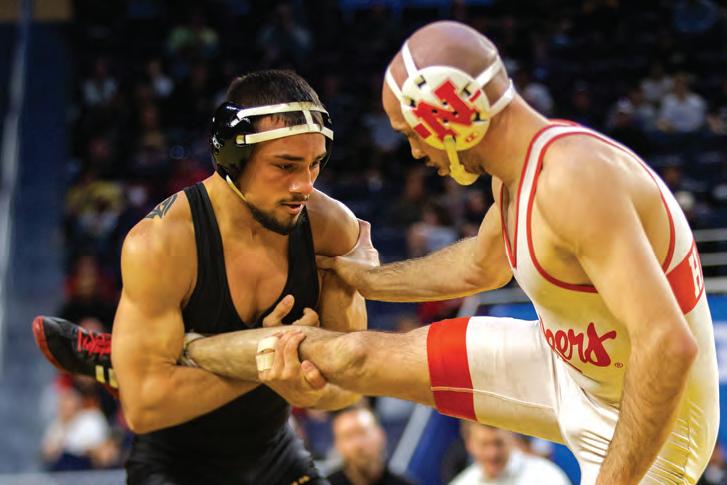
Lee continued to dominate every opponent following his season debut, collecting eight falls in a combined 14:22, four tech falls, and two major decisions.
But Lee said after his most recent conference championship he has a lot
said of Zuhlke. “She has no clue how good she is, and she’s very humble about what she’s capable of. You can tell that she’s uncomfortable with celebrating herself, but she will go nuts for her team.”
Zuhlke competes in three events and consistently contributes to the team score. On vault, she competes a skill named after her: the Zuhlke 2.
“I’m still wrapping my head around the idea that I have my own vault,” Zuhl-
Mannix said. “I think, especially for the international kids, it’s a little bit of a shock to the system sometimes. You kind of just, after the first few matches, have to embrace the environment and realize that being loud is a part of college tennis. Being energetic and positive isn’t something that’s really going to hurt you and doesn’t have a downside.”
Ever since Schmid’s first year coaching at Iowa in 2016, the team has always done some version of the iconic “I-O-W-A” chant. This year, the Hawkeyes all huddle in a circle with arms wrapped around one another, swaying back and forth while rhythmically shouting the letters.
to work on and still wants to accomplish more in the Black and Gold singlet. Lee added that he felt he was moving backward too often against Cronin.
“In my head, I kept telling myself, ‘You have to keep scoring Spencer, you have to keep scoring,’ and I don’t think I did a good enough job with that,” Lee said. “For me, as long as I’m moving my hands and feet, I should be scoring. You have to make up your mind, and you have to go for it. You have to circle back to the center of the mat and get your offense going.”
The three-time national champion heads to the NCAA Championships on a 55-match win streak — the eighth-longest stretch in program history.
Lee would be the first in Iowa wrestling history and only the fifth-ever collegiate grappler to win four individual NCAA titles.
“What’s in the past is in
ke said. “It’s still crazy to me, even though I’ve been doing it for quite a while.”
Zuhlke discussed how the inspiration behind the vault came from a mental block she had on the more common Yurchenko skill in club gymnastics.
“I would just stop going for it,” Zuhlke said. “I wouldn’t go backwards anymore.”
Knowing she still had to compete vault, her coach came up with a new vault — one no one had done
“Any time it’s right at the beginning of the match, that makes a difference,” Mannix said. “You always want to start out with positivity because realistically the match has just started, and it can go either way … I think it’s nice that we all do [the chant] together this year.”
Mannix said she has learned when to be positive and outspoken over the course of her career. She said it’s essential for teammates to hear your voice and see positive body language during crucial games against quality opponents.
“There’s times when it can help your team, just knowing that somebody

the past,” Lee said. “One thing we always say is, ‘On to the next.’ The NCAAs are the next thing. The practic-
before — which would allow her to do a front-entry vault.
“I walked into practice one day, and my coach was like, ‘Try a front handspring and then a Tsuk and then a flip off,’” Zuhlke said.
Zuhlke was excited to try something new, even though most people consider her vault scary.
“I’m pretty open to trying new things,” Zuhlke said. “I really don’t think it’s that scary, but a lot of
is doing well on the court next to you, or bringing up the positivity,” Mannix said. “I think sometimes when it comes down to tight matches, that’s when it’s really important, when it can really go one way or another … Against teams that are equal, or a quality team, it’s really important to stay positive, be loud, and make sure you’re motivating your teammates so that they’re not looking over and your shoulders are slumped.” On the court, fans can hear Mannix yell her trademark celebration of “come on” after every point she scores. Other players display similar celebrations — with international recruits, these
es leading up to NCAAs, we need to get back to getting healthy, strong, the whole team and everyone. Let’s
people think it’s terrifying. It worked for me because I thought Yurchenkos were terrifying.”
The Zuhlke 2 is rewarded a 10.0 start value for its difficulty and Zuhlke has come close to pulling it off perfectly. On Feb. 24, Zuhlke scored a 9.9 to earn herself a career-high score. Libby applauded Zuhlke’s work on all events.
“She has more to celebrate this season,” Libby said. “She’s probably the

exclamations are sometimes in foreign languages.
“It happens for everybody — there’s different variations,” Mannix said.

“If you’re international, everybody has their own form of cheering. You hear, ‘Yes,’ ‘Come on,’ ‘Let’s go,’ and everything. It’s kind of just whatever you can yell loudest at the time … If your teammates on the other side can hear it, then you’re doing a good job.”
Calling herself one of the louder voices on the team, Mannix said having enthusiasm in college tennis comes from the team aspect of the sport.
“Just realizing that, in a college match, it’s not just about yourself, and
get ready for a strong NCAA tournament.”
mckenna-roering@uiowa.edu
most successful she’s been in her entire career. I hope that by the time of her senior year that she will celebrate herself.”
Zuhlke feels that her time on the team has made her a better gymnast. “Being in a more team environment, I know my teammates have my back,” Zuhlke said. “It makes me feel more confident in myself, which helps me to do my gymnastics better.” emma-sachs@uiowa.edu
that if you need to be loud to help your teammates, that’s what you do,” Mannix said.
Schmid said the greatest benefit of embracing the environment is good performance, which ultimately determines the outcome of the match.
“[The result of the match] is going to come down to tennis, but I do think that energy has to come before the tennis and not the other way around,” Schmid said. “Because if you’re waiting to play well to have energy, then it’s always kind of the wrong way of thinking about it. Your energy has to bring good tennis.”
matthew-r-mcgowan@uiowa.edu

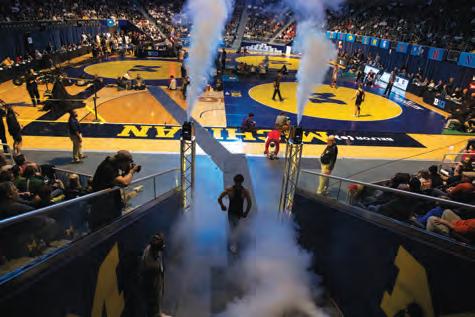

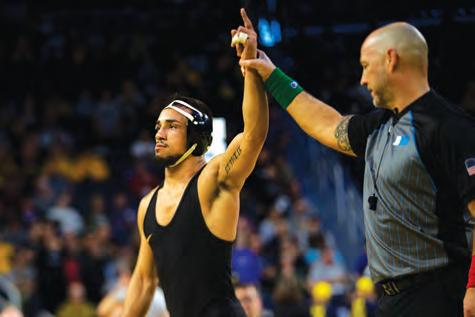

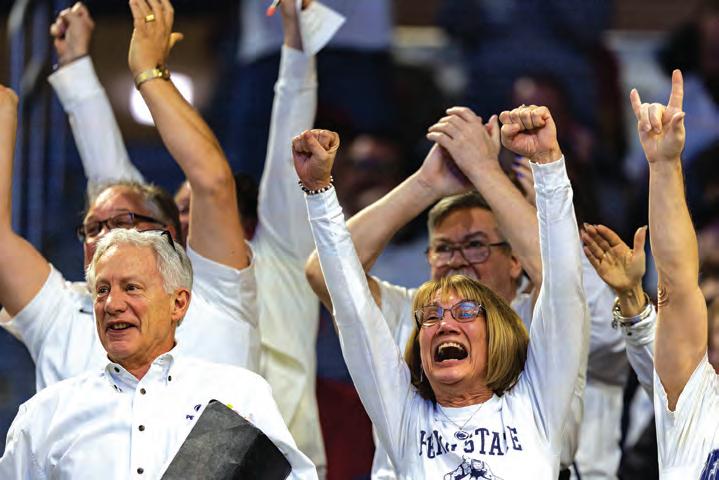
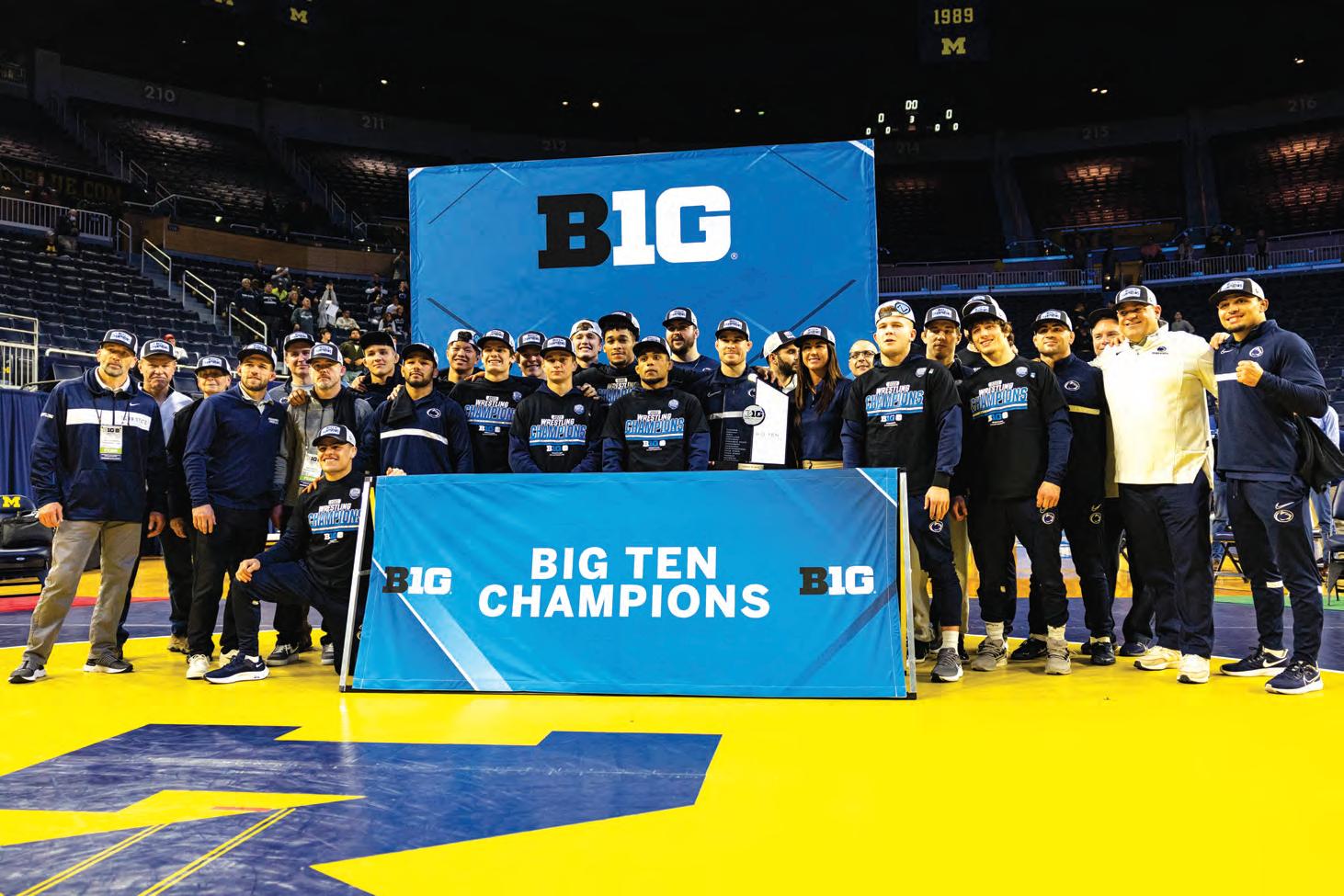
Lee’s legacy continues
No. 1 seeded 125-pound Iowa's Spencer Lee stands on top of the podium after finishing first place in his weight class during Session IV
Kenna Roering Sports Reporter
ANN ARBOR — Iowa
men’s wrestler Spencer Lee dominated his way through the 125-pound bracket en route to his third Big Ten title Sunday night at the Crisler Center.
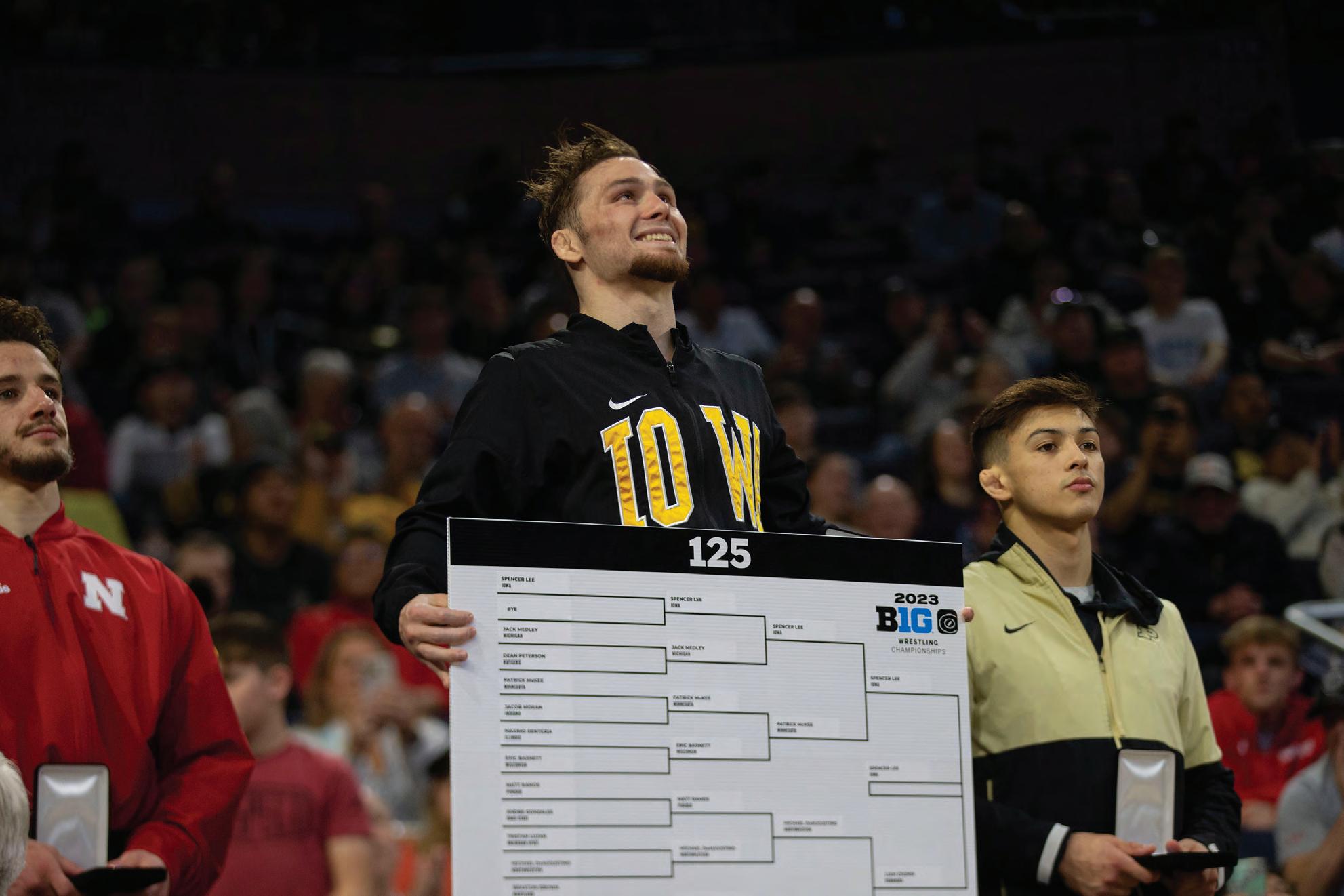
The Hawkeyes finished second in the team standings with 132.5 points,
HAWKEYE UPDATES
Gymnastics sets home attendance record
The No. 20 Iowa women’s gymnastics team defeated No. 39 Iowa State Saturday night at Carver-Hawkeye Arena, 195.275-194.200. A record-breaking 3,715 fans attended to honor the seniors and raise awareness for cancer.
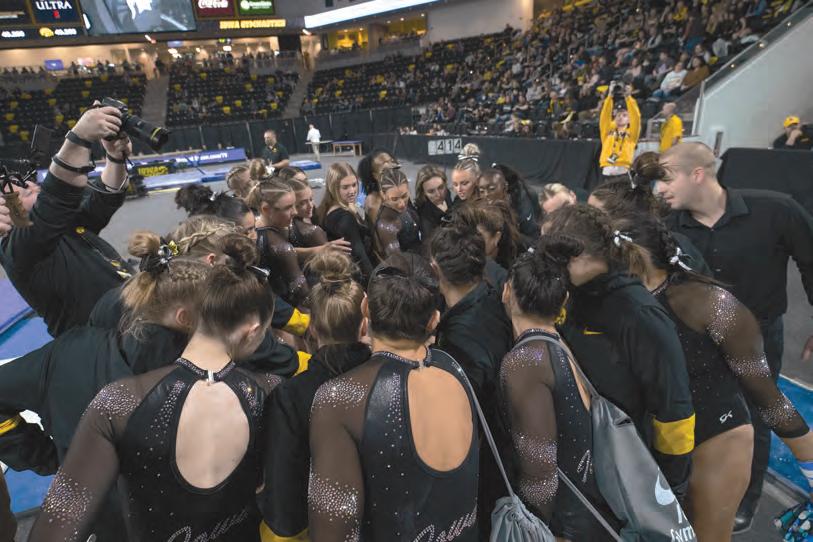
Iowa head coach Larissa Libby praised the Hawkeye community for showing out against in-state rivals.
“It says a lot about the personality of this team. It says a lot about gymnastics in general,” Libby said. “But also, it says a lot about women’s sports. When I look in the stands and I see all these little girls with signs and so fired up about gymnastics, it really is such a great feeling because I think they’re learning that it’s not just a pretty sport. It drives us to be better.”
Larissa Libby
The Hawkeyes started off strong on vault and bars against the Cyclones, leading, 98.12597.250, after the first two rotations.
But the Cyclones took the lead after the third rotation, with the Hawkeyes counting two falls on beam.
“You have to learn to let those things go,” Libby said. “These are things that happen to teams all the time. What will decide whether you’re a good team or an okay team is how you respond to it.”
The Hawkeyes responded on floor and counted five scores over 9.8.
QUOTE OF THE DAY
“It was Hawkeye Carver Arena North up here.”
— Head coach Lisa Bluder on the Hawkeye fans at the Target Center in Minneapolis for the Big Ten Women’s Basketball Tournament.
STAT OF THE DAY
9,505
— The attendance for the Big Ten Championship Game between Iowa and Ohio State — a tournament record.
trailing behind Penn State’s 147. Iowa had one more wrestler on top of the podium, as 141-pound Real Woods claimed a Big Ten title in his tournament debut against Nebraska’s No. 3 seed Brock Hardy, 2-1. Hawkeye 165-pounder and No. 3 seed Patrick Kennedy fell in the championship match to Wis-
consin’s No. 1 seed Dean Hamiti, 9-6. Lee defeated Nebraska’s No. 2 seed Liam Cronin in the finals, 8-2, for his ninth-straight victory in the Big Ten Tournament. The win further solidified the Big Ten Wrestler of the Year's dominance ahead of the NCAA Championships in Tulsa, Oklahoma, from March 16-18.
“[Cronin] had a good game plan,” Lee said at a media availability session following his championship victory. “He was pushing a lot, pushing the pace. He pushed me around a little bit and forced things. He was ready to go, and I respect him a lot. I’m looking forward to wrestling him at nationals two weeks from
now.” Lee received a No. 1 seed at the conference tournament for an automatic first-round bye. He kicked off the quarterfinals for the Hawkeyes with a 17-0 tech fall in five minutes over Michigan’s No. 9 seed Jack Medley.
In the semifinals, he cruised to a 20-2 tech fall victory in the second peri-
od over Minnesota’s No. 5 seed Patrick McKee. When the pair faced each other in the regular season, Lee won, 7-1 — his smallest margin of victory this season. Although Lee makes it look easy on the mat, his wrestling journey has been filled with adversity.
WRESTLING | Page 6
Zuhlke finds family Energy serves well
Sasha Schmid and Samantha Mannix think the college tennis environment is advantageous.
Cody Blissett/The Daily Iowan
Iowa’s Pia Kranholdt stands ready during a women’s tennis meet at the Hawkeye Tennis and Recreational Complex on Feb. 5. The Hawkeyes defeated the Wildcat’s, 4-1.

Matt McGowan Sports Reporter
Iowa women’s tennis player Samantha Mannix will always remember that road match. On March 13, 2021, Mannix and the Hawkeyes faced off against Illinois at Atkins Tennis Center in Champaign, Illinois.
Emma Sachs Sports Reporter
Transferring schools can be the start of a new opportunity or a lonely journey. But for Iowa gymnastics junior Allison Zuhlke, it was a necessary decision to bring her closer to her family.
Despite having a great experience at Towson University during her freshman year, Zuhlke came to Iowa before the start of the 2021-22 school year.
“I loved it at Towson,” Zuhlke said. “But being in Maryland was super far away, and I really struggled. I loved the team. I loved the coaches. It was probably one of the hardest decisions I’ve ever made to have to transfer because it was just solely on wanting to be closer to home.”
Zuhlke, a Wisconsin native, began searching for a school within four hours of her family
so they could visit and watch her competitions in person. While searching for schools to transfer to, Zuhlke also valued finding a team that reflected her love for her family.
“Everyone seems so genuinely happy for each other, unlike a lot of other teams that just kind of look forced,” Zuhlke said about Iowa’s gymnastics team. “That was something I was drawn to because I’m really a family girl.”

Iowa head coach Larissa Libby enjoyed getting to know Zuhlke during the recruitment process.
“I'm grateful that she found us and that she continued to think of us as she was trying to make a decision to come closer to home,” Libby said of Zuhlke. “She is a mystery all the time. And so, as we're peeling back the layers and getting to know her, it's pretty cool to see the person that's coming out.”
Libby discussed how Zuhlke fit right into the team from the start and mentioned how the transfer recruitment process can be difficult, but Zuhlke’s values made her an obvious choice.
“The way she handled herself was just so bubbly. It was easy,” Libby said. “Her whole family aspect was important because it's important in our program, so I knew that she understood it.”
Zuhlke joined the Iowa gymnastics team her sophomore year and immediately felt welcomed by her teammates and coaches. She said being at Iowa has helped her strive to be a consistent leader on the team.
“I want to be a gymnast my whole team can trust and rely on,” Zuhlke said. “That’s what pushes me in practice. I want ZUHLKE | Page
Iowa had won their previous meeting against the Illini, a 4-2 victory in Iowa City. One month later, the team played in an environment that Mannix, now a fifth-year senior, won’t soon forget.
“They have a similar facility to us, an extended row, and they had a lot of people show up,” Mannix said. “They had their men’s team cheering against us. And we definitely felt the pressure … especially if they have those spectators cheering against you when you double fault or when you miss, anything like that.”
Iowa lost the match, 4-3, amid an atmosphere typical of the collegiate tennis scene — where both the crowd and players let their voices be heard.
“I think college tennis matches are a lot more enthusiastic and energetic than normal professional tournaments,” Iowa head coach Sasha Schmid said. “That whole idea that you have to be quiet is not the same environment in college tennis. I think it’s a unique atmosphere in that it can be rowdy, loud, and spirited.”
The Hawkeyes feature two international freshmen this season in Daianne Hayashida from Lima, Peru, and Pia Kranholdt from Karlsruhe, Germany. Schmid said her coaching em-

